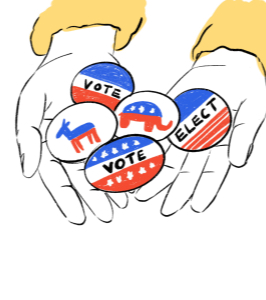In new lawsuit, religious nonprofit targets Johnson Amendment in order to endorse political candidates without losing tax-exempt status

It’s been a few years since there was a concerted effort to overturn the Johnson Amendment, that portion of the tax code that prohibits 501(c)(3) nonprofit organizations – which includes houses of worship — from endorsing or opposing a political candidate as a condition of their special tax status. The Johnson Amendment protects nonprofits from being entangled in electoral politics, and in turn it protects taxpayers from unwittingly providing tax exemptions to an agent of a political campaign.
Back in 2017, after then-President Donald Trump promised to “totally destroy” the Johnson Amendment and issued an Executive Order restricting its enforcement, Congress considered repealing it during negotiations over the tax bill. BJC along with 100+ other religious groups successfully argued for its importance in protecting houses of worship, and the provision remained in place. In 2018, members of Congress opposed to the Johnson Amendment again threatened to remove it as part of the appropriations bill process, but they were unsuccessful after, as BJC Executive Director Amanda Tyler said, “advocates for keeping nonprofits nonpartisan spoke up and prevailed.”
Now, a group of plaintiffs, including the National Religious Broadcasters, have filed suit seeking to have the Johnson Amendment declared unconstitutional. They argue that it violates the First Amendment’s Free Speech and Free Exercise of religion provisions, as well as the Religious Freedom Restoration Act. Specifically, they challenge the legality of treating 501(c)(3) organizations differently from nonprofits that are organized under different parts of the Internal Revenue Code and are allowed to endorse and oppose candidates. The complaint also points to the many newspapers that are “organized under 501(c)(3) and yet … openly endorse political candidates.” It also argues that churches are discriminated against by being automatically placed in the 501(c)(3) category, which “thereby silences their speech, while providing no realistic alternative for operating in any other fashion.”
Churches – like any other nonprofit organizations – are of course free to endorse or oppose political candidates; they just can’t claim the special tax privileges that accompany 501(c)(3) status while doing so. There are also several other election-related activities 501(c)(3) organizations including houses of worship CAN engage in without running afoul of the Johnson Amendment: issuing nonpartisan voter guides, hosting a candidate forum, driving voters to the polls and assisting with voter registration, to name just a few.
There are good reasons to keep the Johnson Amendment in place and for churches to refrain from engaging in electoral politics from the pulpit. As BJC and others explained in a 2017 letter to Congress, “[p]ermitting electioneering in churches would give partisan groups incentive to use congregations as a conduit for political activity and expenditures. … The charitable sector, particularly houses of worship, should not become another cog in a political machine.” And they also shouldn’t risk the congregational fracture that may accompany a decision to turn the pulpit into yet another vehicle for partisan politics. Churches cannot maintain their prophetic voice speaking truth to power while also engaged in a bear hug with political candidates and political parties.
For more on this issue, see BJC’s Johnson Amendment resource page, which includes a one-page guide for churches and nonprofits on how to be advocates without being partisans during any election season.




